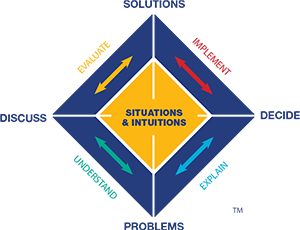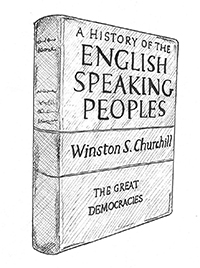Situations and Intuitions
-
-

Have you been in a situation and had the sense of knowing what will happen next? We sometimes refer to it as our sixth sense and call it ‘intuition’. One’s mind seems to be working ahead of events, and telling us what to expect. The question is how should we treat intuition as part of the problem solving process? Should we ignore it as being not scientific? Or, should we accept it as an important part of understanding and try to get facts to support it?
Intuition can be very important. It may be that a person has been in a similar situation before and therefore, has a strong sense of what could happen. That kind of experience can be useful, providing it is transferred in a way that is tested for the new situation.
It is likely that people who are very creative will be quite intuitive. Their ideas often go beyond what is currently happening. Indeed, they may well start to create the future based on their ideas and intuition. This is called the ‘Self Fulfilling Prophecy’, where people facilitate an event by leading others to expect it, and they behave in a way that creates it. Politicians, for example, who have strong intuitions, can have this effect. The same is true in business where someone has a strong intuition regarding a new product, and this leads to more advertising and effort to make it known.
-
Winston Churchill
 Leaders do not always have the information available in order to support a decision. Often, they need to use their intuition. Sometimes, this is called the 'sixth sense' and it helps one to understand what is needed. Winston Churchill was a controversial politician. He made a number of statements about situations, which were based on his intuition. In particular, he warned in the 1930s, that the Germans were preparing for war, once again. Many people ignored him. However, his intuition was correct and he was called upon to lead Britain during the Second World War. In this audio article, you can hear how to best use and process intuitions.
Leaders do not always have the information available in order to support a decision. Often, they need to use their intuition. Sometimes, this is called the 'sixth sense' and it helps one to understand what is needed. Winston Churchill was a controversial politician. He made a number of statements about situations, which were based on his intuition. In particular, he warned in the 1930s, that the Germans were preparing for war, once again. Many people ignored him. However, his intuition was correct and he was called upon to lead Britain during the Second World War. In this audio article, you can hear how to best use and process intuitions. -
Applications

Look at your own situation and the people with whom you work:
-
What have been the major intuitions that have guided your approach to problem solving?
-
How have you used them?
-
In contrast, how do you work with the intuition of others?
-
What evidence do you request before taking action?
-
-